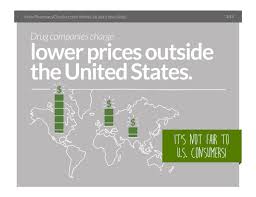by Gabriel Levitt, President, PharmacyChecker.com and Prescription Justice | Feb 23, 2018 | Drug Importation

I’m telling you Canadian drugs are safe but vote against importation.
In the Utah House of Representatives, Health and Human Services Committee, there was a meeting a few weeks back to discuss Rep. Norman Thurston’s drug importation bill. The bill’s aim is to lower prescription drug costs for Utah by importing lower-cost medications from Canada. The committee passed it 9-2. A week later, the Utah House passed the bill 39-31! But in that committee meeting, during the public session where organizations came out in favor and against the bill, something unique happened.
During his remarks against Thurston’s drug importation bill, one Mr. Peter Pitts said, and I quote from the audio clip: “I will tell you one thing in defense of Canada…If you drive up across the border and you go to a brick and mortar pharmacy and you get a product. That product is safe and effective; just as safe and effective as a U.S. product.”
I’ve followed and written about Big Pharma’s positions on importation for over 15 years. Its mantra and that of its hired guns is that the U.S. system for regulating pharmaceuticals is the world’s “gold standard.” As you’ll discover, Mr. Pitts, as I see it, is one of those hired guns and a notable one. Therefore, it’s great and fun to have him on the record, clearly (emphatically) stating that Canada’s system for regulating prescription drugs and the drugs sold in Canadian pharmacies are just as good as the ones sold here. That means Canada is the Gold Standard, too!
Listen to the whole hearing.
Note to all my fellow Americans that didn’t already know: if you live close to Canada and can’t afford your medication, then, according to Mr. Pitts, the medication there is damn good…not to mention a lot less expensive. Did you also know that federal law bans U.S. Customs Border Patrol from preventing people who are traveling back from Canada from importing small quantities of prescription drugs when they are for personal use? See: Can I drive to Canada to fill a prescription?
Who is this guy? Who cares? (more…)
Tagged with: Canada, Canadian pharmacies, CMPI, Peter Pitts, Pfizer, phrma, thurston, utah
by Gabriel Levitt, President, PharmacyChecker.com and Prescription Justice | Jan 30, 2018 | Drug Importation

The Utah State Capitol
Utah State Representative Norman Thurston (R-64) has introduced legislation that would allow pharmacy wholesalers in Utah to import lower-cost pharmaceuticals to be sold within state lines. The bill’s goal is to lower the growing burden of prescription drug costs on the Utah budget and reduce out-of-pocket costs for Utah residents. The legislation is largely based on model state drug importation legislation drafted by the National Academy for State Health Policy (NASHP).
The bill, H.B. 163, “The Canadian Prescription Drug Importation Act,” differs substantially from past state-based initiatives, legislation, and laws on prescription drug importation. The most pronounced difference is that it seeks formal approval from the federal government to import medication from Canada. Past state laws on drug importation sought to circumvent federal regulations, such as in Maine, where the law was overturned in 2015. (more…)
Tagged with: azar, nashp, state, thurston, utah
by Lucia Mueller, President, PharmacyChecker.com | Jan 14, 2018 | Drug Importation
 The December 17th episode of the television comedy Shameless provides a pathetic commentary on unfairly high prices of drugs in the U.S. In the episode, the lead character, Frank, announces that, for a fee, he’ll help smuggle Americans into Canada. But, it turns out, what people really want is for Frank to buy and bring back their much-needed medicines–medications such as EpiPens, insulin, Invokana, and Tecfidera from Canada where they are more affordable.
The December 17th episode of the television comedy Shameless provides a pathetic commentary on unfairly high prices of drugs in the U.S. In the episode, the lead character, Frank, announces that, for a fee, he’ll help smuggle Americans into Canada. But, it turns out, what people really want is for Frank to buy and bring back their much-needed medicines–medications such as EpiPens, insulin, Invokana, and Tecfidera from Canada where they are more affordable.
Here’s the dialogue:
(more…)
Tagged with: Canada, Insulin, pop culture, shameless
by Gabriel Levitt, President, PharmacyChecker.com and Prescription Justice | Dec 29, 2017 | Drug Importation

Words matter when it comes to drug importation
As we close out 2017, personal drug importation via online pharmacies remains a viable lifeline for American patients who can’t afford prices at their local pharmacies. Recent FDA actions against pharmacy storefront offices in Florida, ones that help Americans buy more affordable meds internationally, are troubling. On a positive note, a backlash against that crackdown by members of Congress, including Senators Bill Nelson (D-FL), Chuck Grassley (R-IW), and Amy Klobuchar (D-MN) has begun and will certainly grow. But what’s most on my mind is the FDA’s vocabulary about drug importation and how people tend to confuse certain terms.
In its efforts against personal drug importation, the FDA tells the public that it’s protecting them from misbranded and unapproved drugs. Those designations sound scary and who would want such drugs? Well, Americans would. The fact is, whatever the FDA wants to call them, if medications are lawfully-produced under Good Manufacturing Practices, properly dispensed by a licensed professional and shipped by mail order, Americans are interested.
Oh, and these drugs are a hell of a lot cheaper.
Despite the clear advantages, these medications deemed to be misbranded or unapproved under U.S. law can be refused import by the FDA even if they are equally as safe and effective or the exact same as the medications sold in the U.S.
Here’s why… (more…)
Tagged with: adulterated, counterfeit, deflazacort, emflaza, FDA, marathon, misbranded, unapproved
by Gabriel Levitt, President, PharmacyChecker.com and Prescription Justice | Dec 7, 2017 | Drug Importation
 For years, the National Association of Boards of Pharmacy (NABP) has opposed new drug importation proposals that would improve access to more affordable medication from Canada and other countries. Led by its executive director, Carmen Catizone, PharmD, the NABP’s efforts pertaining to drug importation have focused mostly on opposing online access to imported medications – meaning Americans getting cheaper meds from Canada and other countries. This is not surprising. NABP has received a lot of money from pharmaceutical companies for these efforts. Also, NABP represents U.S. pharmacy boards and the members of those boards often have financial interests in U.S. pharmacies. But here’s a surprise…
For years, the National Association of Boards of Pharmacy (NABP) has opposed new drug importation proposals that would improve access to more affordable medication from Canada and other countries. Led by its executive director, Carmen Catizone, PharmD, the NABP’s efforts pertaining to drug importation have focused mostly on opposing online access to imported medications – meaning Americans getting cheaper meds from Canada and other countries. This is not surprising. NABP has received a lot of money from pharmaceutical companies for these efforts. Also, NABP represents U.S. pharmacy boards and the members of those boards often have financial interests in U.S. pharmacies. But here’s a surprise…
Earlier this week, an article in the Washington Post focused on various prescription drug importation programs offered by cities, counties and schools to lower pharmaceutical bills for retirees and municipalities. According to the article, the FDA may view these programs as illegal. The FDA recently raided some pharmacy storefronts in Florida but did not shut them down. Operating for 10, some even 15 years, those programs help Americans—especially the elderly— order affordable medications from other countries.
Mr. Catizone had the last word in the article. (more…)
Tagged with: Carmen Catizone, drug importation program, Flagler, Kokomo, NABP, Schenectady
by Gabriel Levitt, President, PharmacyChecker.com and Prescription Justice | Nov 3, 2017 | Drug Importation
 This week, FDA Commissioner Scott Gottlieb announced that inspections by drug regulatory authorities of foreign manufacturing plants that export pharmaceuticals to the U.S. are sufficient to ensure the integrity of those products: meaning the FDA doesn’t also need to inspect them. The countries identified are Austria, Croatia, France, Italy, Malta, Spain, Sweden, and the United Kingdom. All are currently members of the European Union (the UK is soon Brexiting).
This week, FDA Commissioner Scott Gottlieb announced that inspections by drug regulatory authorities of foreign manufacturing plants that export pharmaceuticals to the U.S. are sufficient to ensure the integrity of those products: meaning the FDA doesn’t also need to inspect them. The countries identified are Austria, Croatia, France, Italy, Malta, Spain, Sweden, and the United Kingdom. All are currently members of the European Union (the UK is soon Brexiting).
Although this has made headlines as an unprecedented practice, the FDA relying on inspections from foreign regulators is not an entirely new development. The FDA does not inspect all foreign plants that export medicine to the U.S. even though most pharmaceuticals sold in the U.S. are foreign-made.
So what’s with the big announcement then?
(more…)
Tagged with: FDA Commissioner, foreign made, Scott Gottlieb








